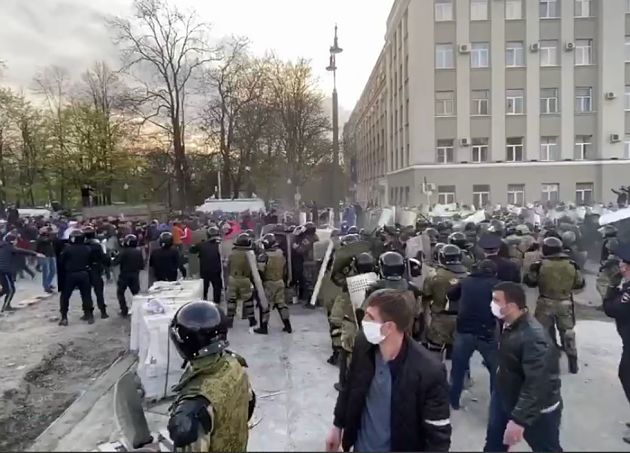The Kremlin has shifted the burden of fighting the coronavirus to the regional authorities, and their predictable inefficiency is already leading to growing protest sentiment. This is particularly evident in the republics of the North Caucasus. Of course, the most striking example of anti-quarantine protests were the recent events in the capital of North Ossetia, Vladikavkaz. About one and a half thousand people gathered at an unauthorized rally near the republic’s government building, which escalated into clashes with the police, despite the presence of the republic’s head, Vyacheslav Bitarov, who was unable to say anything meaningful to the demonstrators.
It is noteworthy that the local riot police essentially sided with the protesters, as was the case during the recent protests in Ingushetia. The protests had to be broken up by police officers brought in from outside the region.
What were the reasons for these protests? Yes, some of the protesters were an extravagant crowd of quarantine deniers and so-called “citizens of the USSR” who believe that this state continues to exist and that the formations and authorities that have emerged on its territory are illegal. However, this was not the case for everyone.
Many of the demonstrators wore masks, indicating their seriousness about the coronavirus, and they did not deny the need for self-isolation and social distancing. However, they demanded, first, government support for those who have lost their sources of income and, second, consistency in this policy.
But what consistency can be expected when, against the backdrop of this dubious self-isolation, the son of the head of the republic holds a wedding attended by thousands of guests? Or when his companies continue to operate at full capacity, regardless of everything, while small businesses are closing down, and their closure without support is tantamount to death?
So it is completely wrong to blame the ignorant attitude of the population to the danger of the coronavirus, as the authorities of neighboring Ingushetia did. Its leader, Mahmud-Ali Kalimatov, made an emotional appeal to the people of Ingushetia, implying that the authorities were doing everything necessary to combat the threat, but that the population was behaving irresponsibly.
However, this attempt to admonish the people has provoked an opposite reaction from many Ingush people. Thousands of commentators on various social networks pointed out that Kalimatov’s statement about providing the health system with everything it needs does not reflect reality.
Similar sentiments were expressed by members of the recently formed Council of Teips of Ingushetia, which the authorities are trying to ban as an independent body of popular representation. The elders of the Ingush teips pointed to the extremely unfavorable trend of the spread of the coronavirus in Ingushetia, which significantly exceeds the rates in neighboring Chechnya and Dagestan.
The elders did not absolve their fellow citizens of responsibility for this situation, but urged them to use common sense. But they also drew attention to the incompetence of the current authorities, whose grandiose statements are at odds with reality and are openly ridiculed on social media. One of the reasons for this is the crisis of legitimacy, as the calls for self-restraint come from those who have completely discredited themselves through the events of the past and the year before, while those who enjoy trust and authority in society continue to languish in prison.
Speaking of these people, it is worth recalling that prominent representatives of Ingush civil society were thrown into Putin’s dungeons on charges of organizing mass disorder in the form of unauthorized protest rallies. And real prison sentences await them. Against this backdrop, the people of Ingushetia are now closely watching the consequences of the unauthorized rally, which led to much more violent clashes with the police in neighboring North Ossetia. Will the local and Russian authorities react as harshly to the participants and leaders of the rally? Or will they show leniency to this republic, which positions itself as an “outpost of Russia” in the unreliable Muslim Caucasus in order to maintain its loyalty?

